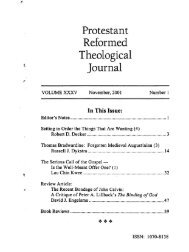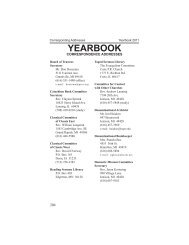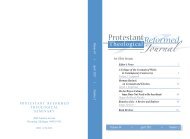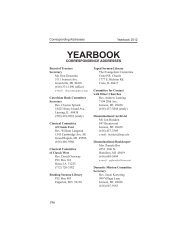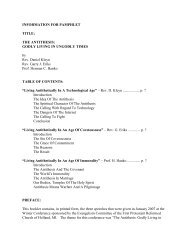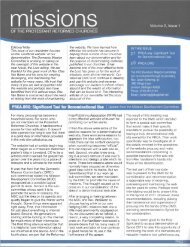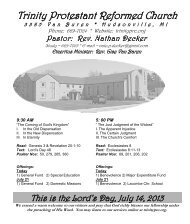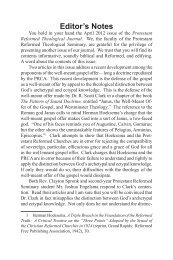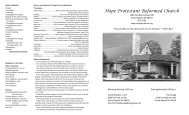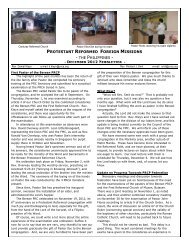November 2007 - Protestant Reformed Churches in America
November 2007 - Protestant Reformed Churches in America
November 2007 - Protestant Reformed Churches in America
Create successful ePaper yourself
Turn your PDF publications into a flip-book with our unique Google optimized e-Paper software.
<strong>Protestant</strong> <strong>Reformed</strong> Theological Journal<br />
Whoever, therefore, forbids an unregenerate man to pray for regenerat<strong>in</strong>g<br />
grace, forbids him to pray for any and all grace. In prohibit<strong>in</strong>g<br />
him from ask<strong>in</strong>g God to create with<strong>in</strong> him a clean heart, he prohibits<br />
him altogether from ask<strong>in</strong>g for the Holy Spirit. 65<br />
In addition we note that David petitioned God to create <strong>in</strong><br />
him a clean heart when he was already regenerate (Psalm 51:10).<br />
Never <strong>in</strong> the history of the world has an unregenerate s<strong>in</strong>ner asked<br />
God for regeneration.<br />
Shedd warns that the s<strong>in</strong>ner must not be slack <strong>in</strong> this work of<br />
conviction:<br />
The Holy Spirit can convict a s<strong>in</strong>ner without his co-operation … but<br />
this is not to be counted upon … he [the s<strong>in</strong>ner] must endeavor to<br />
deepen … the sense of s<strong>in</strong> which has been produced <strong>in</strong> his conscience,<br />
or he is liable to be entirely deserted by the Spirit, and left to his own<br />
will, and be filled with his own devices. The s<strong>in</strong>ner cannot co-operate<br />
<strong>in</strong> the work of regeneration, but he can <strong>in</strong> the work of conviction.<br />
66<br />
However, none of this makes God a debtor. This preparation<br />
does not make a man “deserv<strong>in</strong>g” of regeneration but a “suitable<br />
subject for the exercise of God’s unmerited compassion <strong>in</strong> regenerat<strong>in</strong>g<br />
grace.” 67 After seek<strong>in</strong>g, desir<strong>in</strong>g, prepar<strong>in</strong>g himself, and<br />
pray<strong>in</strong>g, the s<strong>in</strong>ner may f<strong>in</strong>d that God leaves him <strong>in</strong> his unregenerate<br />
state. The s<strong>in</strong>ner may not compla<strong>in</strong>, because God is exercis<strong>in</strong>g<br />
His div<strong>in</strong>e prerogative of sovereignty. The s<strong>in</strong>ner, therefore,<br />
must “proceed upon a probability.” 68 In the end his desires<br />
may be denied.<br />
The s<strong>in</strong>ner may even prepare himself for regeneration by giv<strong>in</strong>g<br />
up heretical notions. If a s<strong>in</strong>ner believes he is not a helpless<br />
s<strong>in</strong>ner, denies that s<strong>in</strong> deserves endless punishment, or that the<br />
vicarious atonement is necessary, he is not, <strong>in</strong> such a state, pre-<br />
65. Shedd, Theology, vol. 2, p. 514.<br />
66. Shedd, Theology, vol. 2, p. 515.<br />
67. Shedd, Theology, vol. 2, p. 516, italics added.<br />
68. Shedd, Theology, vol. 2, p. 516.<br />
74<br />
Vol. 41, No. 1



